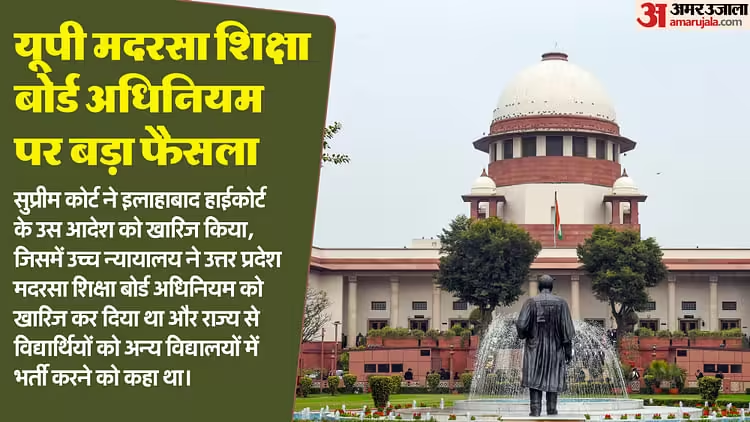
Supreme Court
– Photo: Amar Ujala
Expansion
The Supreme Court has upheld the constitutional validity of the ‘Uttar Pradesh Madrasa Education Board Act 2004’. The court said that this does not violate the principle of secularism. The Allahabad High Court erred in holding that the Uttar Pradesh Madrasa Act would have to be struck down because it violates the basic structure i.e. the principle of secularism.
The court rejected the Allahabad High Court’s March 22 judgment that had struck down the UP Madrassa Act. The Court held that the UP Madrassa Act is unconstitutional only to the extent that it grants higher education degrees under Fazil and Kamil, which is contrary to the UGC Act. The Court also said that the legislative scheme of the Uttar Pradesh Madrasa Education Board Act is for standardization of the standard of education imparted in Madrasas.
What’s in the Supreme Court’s decision?
Setting aside the decision of the Allahabad High Court, a bench of Chief Justice DY Chandrachud, Justice JB Pardiwala and Justice Manoj Mishra gave a big relief to the madrassas of the state. While delivering the verdict, the Chief Justice said that we maintain the validity of the Uttar Pradesh Madarsa Law. One thing is also that only if the state does not have legislative power, a law can be rejected.
Who gets relief from the decision?
The decision is a big relief for the teachers and students of madrassas of Uttar Pradesh. This is because the High Court had ordered to close these madrassas and enroll the students studying there in other schools of the state.
What is the matter?
In fact, the Supreme Court on Tuesday gave its verdict against the Allahabad High Court’s decision declaring the Uttar Pradesh Madrassa law unconstitutional. The court has declared this law completely legal. The court has rejected the decision of the High Court and has recognized the law. Earlier, on October 22, a bench headed by Chief Justice (CJI) DY Chandrachud had reserved the decision after hearing the petitions challenging the High Court’s decision.
What did the High Court say?
Allahabad High Court, in its decision of March 22, had termed the law as against the Constitution and against the principle of secularism. The High Court had directed the Uttar Pradesh government to enroll the students studying in madrasas in regular schools. In a relief to more than 17 lakh students studying in madrassas, a bench headed by the CJI had on April 5 stayed the High Court’s decision, which had struck down the Uttar Pradesh Madrassa Education Board Act, 2004. During the hearing, the CJI had said that regularizing madrassas is in the national interest.
who said what?
On the Supreme Court’s decision, Lucknow Idgah Imam and All India Muslim Personal Law Board member Maulana Khalid Rashid Firangi said that there is a wave of happiness among the people associated with the Madrasa due to this decision. The UP Madrasa Act was drafted by the UP government itself. How can an act made by the government be unconstitutional? We have said earlier also that apart from Islamic education, we also provide modern education in Madrassas.

